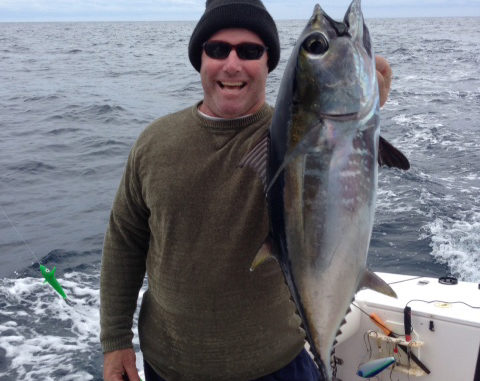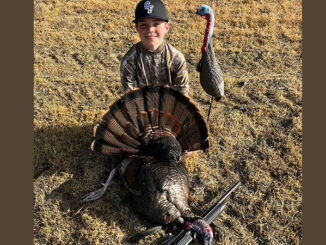
Captains who are finding warm water offshore are finding plenty of tuna
The terrible weather of the past few weeks has kept most fishing vessels docked or high in the dry stacks at marinas, but enough pleasant days have been scattered in between the storms to reach the offshore tuna grounds, and Tom Cushman of Myrtle Beach Fishing Charters has been making the trip out of Little River Inlet, putting double-digit catches of blackfin tuna in the boat – making the long boat rid worthwhile.
“For the last few weeks, the wind has been brutal, and we have struggled to find good weather to make the trip” said Cushman (843-997-5850), “but when we have made it out there, the bite has been real good, with blackfin from 10 to 20 pounds and a few shots at some bigger ones.”
During the winter, the offshore front heats up off South Carolina’s coast. Wahoo, a few dolphin, and big schools of blackfin tuna invade the offshore grounds when the inshore waters chill down to seasonal lows. From January through April, blackfin are the main draw, with a chance to bring dozens of these tasty fish back to the dock on a single trip. But they require water temperatures of at least 68 degrees to thrive, and anglers must find sloughs of warm water to get the rods to sing their tunes. Frigate birds pitching down into the water will give up these schools in no time at all.
On Cushman’s recent trips, the water temperatures have been well within the comfort zone for the mighty blackfin, accounting for his above-average success.
“We are recording water temperatures at the break in the low- to mid-70s that is perfect for tuna,” he said.
Of all of the tunas, blackfin have the least reservations about striking something that resembles a meal. They eat a wide variety of creatures, from fish larvae, crustaceans and squid and large baitfish. Anglers can use just about anything to catch these fish, from large topwater poppers to spoons, yet rigged ballyhoo will produce the most bites and pose the best opportunity to score a mixed bag with a wahoo, dolphin, king mackerel or sailfish during the winter.


